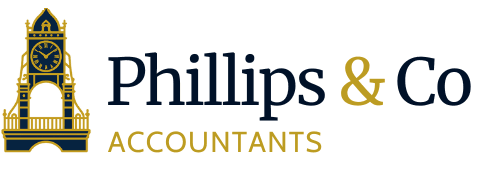Author: Phillips & Co Accountants, Chester
Date: May 6, 2025
The business landscape in 2025 continues to present both exciting opportunities and unique challenges for local enterprises here in Chester. As we move further into the year, ensuring your business not only survives but thrives requires robust financial planning and strategic agility. For fellow Chester businesses, proactive financial management is more critical than ever.
At Phillips & Co Accountants, we work closely with a diverse range of businesses across Chester and Cheshire. We understand the local economic pulse and the pressures you face – from managing rising operational costs to navigating evolving tax legislation. This month, we want to share five essential financial strategies that can help your Chester business build resilience and achieve sustainable growth in the current climate.
1. Master Your Cash Flow: The Lifeblood of Your Chester Business
Cash flow remains king. Without a healthy cash flow, even profitable Chester businesses can struggle.
- Forecast Diligently: Don’t just look at historical data. Regularly forecast your cash inflows and outflows for at least the next 3-6 months. This allows you to anticipate shortfalls and act preemptively.
- Tighten Debtor Management: Invoice promptly and accurately. Establish clear payment terms and follow up on overdue invoices systematically. Consider offering early payment discounts if appropriate for your business model.
- Review Supplier Terms: Are there opportunities to negotiate better payment terms with your suppliers without damaging relationships? Every little helps.
- Control Overheads: Regularly scrutinise your business expenses. Are there areas where costs can be trimmed without impacting quality or growth potential? Many Chester businesses are finding innovative ways to operate more leanly.
2. Strategic Tax Planning: Beyond Just Compliance
For many Chester businesses, tax is often viewed as a year-end compliance headache. However, proactive tax planning throughout the year can lead to significant savings and improved cash flow.
- Understand Allowable Expenses & Reliefs: Are you claiming everything you’re entitled to? This includes capital allowances on equipment, potential Research & Development (R&D) tax credits (even for process improvements), and specific industry reliefs.
- Optimise Your Business Structure: Is your current business structure (sole trader, partnership, limited company) still the most tax-efficient for your level of profitability and future plans? We often help Chester business owners review this.
- Stay Ahead of Changes: Tax legislation evolves. For instance, the phased rollout of Making Tax Digital for Income Tax Self Assessment (MTD for ITSA) continues, with self-employed individuals and landlords with income over £50,000 needing to comply from April 2026, and those over £30,000 from April 2027. Planning for these digital record-keeping and reporting requirements now is crucial. The main rate of Corporation Tax remains at 25% for companies with profits over £250,000, with marginal relief for those between £50,000 and £250,000.
3. Embrace Digital Accounting & Automation
Leveraging technology is no longer a luxury; it’s a necessity for efficient financial management.
- Cloud Accounting Software: If you haven’t already, consider moving to cloud accounting software (like Xero, QuickBooks, Sage Business Cloud). It provides real-time financial insights, simplifies bookkeeping, facilitates collaboration with your Chester accountants, and makes MTD compliance much smoother.
- Automate Repetitive Tasks: Look for opportunities to automate tasks like invoicing, payment reminders, and expense tracking. This frees up valuable time to focus on core business activities.
4. Regular Financial Review & Performance Analysis
Don’t wait until your year-end to understand your financial position.
- Key Performance Indicators (KPIs): Identify and track the KPIs that are most important for your specific Chester business (e.g., gross profit margin, net profit margin, customer acquisition cost, debtor days).
- Management Accounts: Request regular management accounts (monthly or quarterly). These provide a snapshot of your performance, helping you make informed, timely decisions.
- Budget vs. Actual: Regularly compare your actual performance against your budget. Understand the variances and adjust your strategies accordingly.
5. Explore Local Funding, Grants & Support Networks in Cheshire
Keep an eye out for support specifically available to businesses in our region.
- Local Enterprise Partnerships (LEPs): The Cheshire and Warrington LEP often has information on local growth hubs, funding opportunities, and business support programs.
- Chester-Specific Initiatives: Check with local business associations or the council for any Chester-focused grants or schemes that might be available to support growth, innovation, or sustainability.
- Networking: Engaging with other local Chester business owners can provide invaluable insights, support, and potential collaboration opportunities.
Moving Your Chester Business Forward
Navigating the current economic climate requires diligence and a proactive approach to your finances. By implementing these strategies, your Chester business can build a stronger financial foundation, identify opportunities for growth, and confidently face the future.
How Phillips & Co Accountants Can Help Your Chester Business
As your local Chester accountants, we’re passionate about helping businesses like yours succeed. We can provide expert advice and support in all the areas mentioned above, from cash flow forecasting and strategic tax planning to implementing digital solutions and interpreting your financial performance.
If you’d like to discuss how we can tailor these strategies to your specific business needs, please get in touch with our friendly team in Chester today for a no-obligation consultation.
Call us: +44(1244) 220062
Email us: info@phillipscoaccountants.co.uk
Disclaimer
The information contained in this blog is for general guidance only. It does not constitute professional advice and should not be relied upon as such. Always seek tailored advice from a qualified accountant regarding your specific circumstances.
